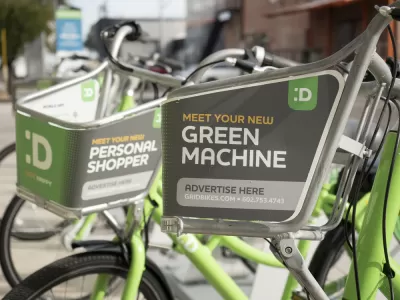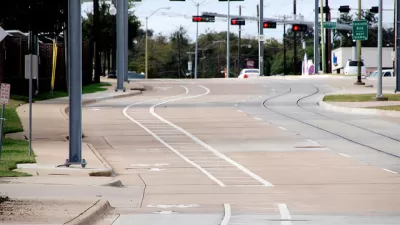Neighborhood opposition overwhelmed a plan to reduce the number of vehicles lanes on North Central Avenue to make space for a new bike lane, despite evidence of the benefits of the proposed street reconfiguration.

"After neighborhood residents fiercely objected to a proposal to add bike lanes along a portion of North Central Avenue, Phoenix transportation officials have killed the project," reports Josh Kelety, on a Spring day in Phoenix that reached 116 degrees Fahrenheit.
The project would have reconfigured Central Avenue to add bike lanes and a central turn lane, reducing the number of car lanes from four to three.
"The decision comes roughly a month after Street Transportation Department officials held a virtual community meeting about the project where neighborhood residents denounced the proposal as dangerous, inconvenient, and inefficient," according to Kelety. The complaints of the opposition included the usual barrage: people on bikes are dangerous, the road diet would push car trips to side streets, and bike lanes are "horrible" for children.
According to Street Transportation Department, the street reconfiguration was pursued in accordance with the city's Transportation 2050 plan, which set a target to add 1,000 miles of new bike lanes in the city of Phoenix. "Research has shown that similar lane reduction projects, also known as 'road diets,' can reduce vehicle collisions by as much as 40 percent," explains Kelety.
FULL STORY: Phoenix Caves to Uptown Residents, Will Abandon North Central Avenue Bike Lane

Planetizen Federal Action Tracker
A weekly monitor of how Trump’s orders and actions are impacting planners and planning in America.

Maui's Vacation Rental Debate Turns Ugly
Verbal attacks, misinformation campaigns and fistfights plague a high-stakes debate to convert thousands of vacation rentals into long-term housing.

Restaurant Patios Were a Pandemic Win — Why Were They so Hard to Keep?
Social distancing requirements and changes in travel patterns prompted cities to pilot new uses for street and sidewalk space. Then it got complicated.

In California Battle of Housing vs. Environment, Housing Just Won
A new state law significantly limits the power of CEQA, an environmental review law that served as a powerful tool for blocking new development.

Boulder Eliminates Parking Minimums Citywide
Officials estimate the cost of building a single underground parking space at up to $100,000.

Orange County, Florida Adopts Largest US “Sprawl Repair” Code
The ‘Orange Code’ seeks to rectify decades of sprawl-inducing, car-oriented development.
Urban Design for Planners 1: Software Tools
This six-course series explores essential urban design concepts using open source software and equips planners with the tools they need to participate fully in the urban design process.
Planning for Universal Design
Learn the tools for implementing Universal Design in planning regulations.
Heyer Gruel & Associates PA
JM Goldson LLC
Custer County Colorado
City of Camden Redevelopment Agency
City of Astoria
Transportation Research & Education Center (TREC) at Portland State University
Jefferson Parish Government
Camden Redevelopment Agency
City of Claremont





























